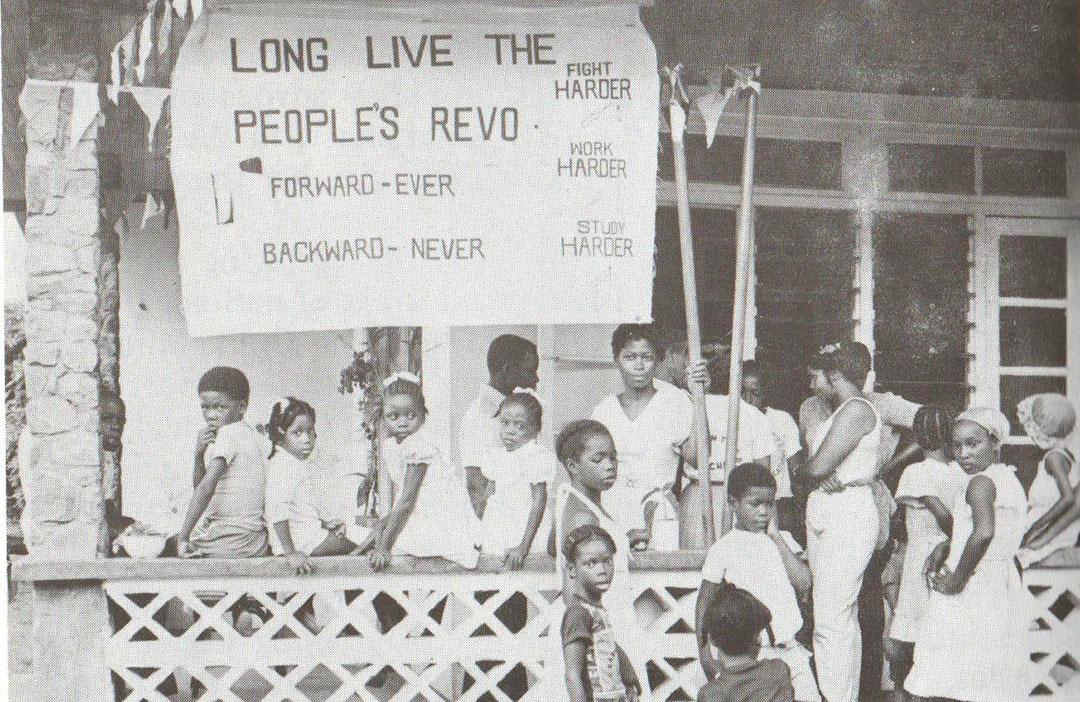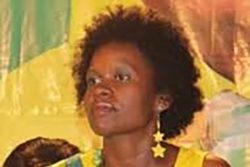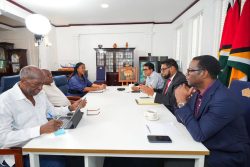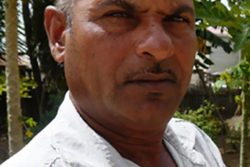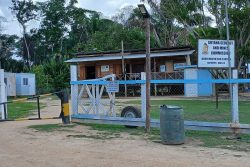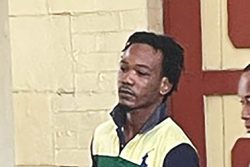Kimalee Phillip is an African-Grenadian woman currently based in Canada. Her body may be in Canada but her heart and spirit are in Grenada and with all people struggling for liberation and freedom. She is a writer, educator and organizer, currently living and working on unceded and unsurrendered Algonquin territory in Ottawa. Her current waged work is a combination of human rights work within the Canadian labour movement and feminist movement building within an international context.
Never has the government of Grenada named March 13 as a significant and memorable day and/or public holiday. The events that took place on that day, 39 years ago in 1979, the inauguration of the Grenadian Revolution, are still not part of the education curriculum, much less mainstream political debates and discussions on the island. Therefore, the current Prime Minister’s decision to name March 13, 2018 as the next general election date leaves one questioning his intent.
There is currently an emptiness, a historical and collective memory void around March 13. It’s not named as a day of significance, unlike October 25, the day our island was invaded by US troops and oddly celebrated as Thanksgiving Day. Considering that March 13 was never deemed significant enough to be named yet the actions that took place on March 13, 1979 reverberate across the Caribbean region and global progressive world, what memories are the Prime Minister and his government trying to erase or replace that void with?
Former Prime Minister Ben Jones of the New National Party (NNP) declared March 13, 1990 as the date for the general elections that year. That electoral process saw the National Democratic Party claiming victory, winning 7 of the 15 seats with a voter turnout of 68.4%. I would like to hope that our current Prime Minister is not reducing the significance of selecting March 13, 2018 to party political games.
This exercise of attaching the general elections to the Revolution anniversary without ever formally naming it as such reeks of a revisionist project where the historical record of what happened on that day is being reinterpreted to fit another agenda. If the government in power had policies, programs and even a political ideological stance that reflected the progressive goals of the New Jewel Movement and People’s Revolutionary Government, then this move would not have been so odd. However, the current government continues to advocate and implement policies that privilege profit, privatization and political maneuvering over the need for accessible, affordable and high-quality education, healthcare, food, land and housing.
One of my concerns is that the results of the 2018 general elections will erase and revise a significant part of Grenadian history that was never commemorated in the first place. This is a dangerous and irresponsible move by the government and one that seems to imply that the people’s best interests were not considered as the government has failed time and time again to even educate the people about that period of history.
How is it that as a child raised and schooled on the island until I was 18, I never formally learned of the revolution until I began my undergraduate studies at a university outside of the Caribbean? The shame that I felt for not knowing was real and valid but I also felt such a betrayal by the education system that nurtured my learning for all of those years. How could students in Jamaica be learning about significant parts of my history when I was not?
Attempts by Grenadians such as Dr. Nicole Phillip-Dowe of the University of the West Indies, Open Campus – Grenada to lobby the Ministry of Education to review the curriculum and include books and articles on the Grenada Revolution continue to fall on deaf ears. Young and older Grenadians are writing and engaging in numerous creative works that tell complex, different and memorable stories of those Revolutionary years and their ongoing impact; yet our own government and leaders refuse to acknowledge those works and their significance.
This political exercise feels part of a revisionist project that seals the idea that Grenadians never engaged in collective liberation work. Despite one’s views about the Revolution, it is our duty to tell our own stories, to hold the pen that illustrates our contributions to global liberation struggles. It is irresponsible that the only time the government chooses to put March 13 in any spotlight is when a general election is taking place, one which is more like a pappyshow and less about a transparent democratic process of the citizenry exercising their civil and political rights.
March 13 should never be about which political party wins at the polls. March 13 belongs to the people, to the historical and collective memory of the Grenadian populace. It belongs to those who risked their lives for freedom and liberation. That day and others such as November 18 (Bloody Sunday 1973, when several members of the New Jewel Movement, including Maurice Bishop, were beaten and imprisoned by agents of the state) and January 21 (Bloody Monday 1974, just two months later, Rupert Bishop, was shot and killed and many others injured during a demonstration) should be integrated into the teaching of Grenada’s road towards independence. Indeed, days such as October 25 (the date of the US invasion in 1983, following the collapse of the Grenada revolution) should be a public holiday but that day should also be renamed to remember Grenadian revolutionaries and our allies who we lost on that day. March 13 should first be named as the liberatory and revolutionary day that it is.
Perhaps this is an opportune time for the Grenadian people to take to the polls and remind the political parties vying for leadership that unless your political platform addresses the material, political, social and cultural needs and sovereignty of the working class and marginalized in our communities, then you can head back to the drawing board.
We must demand that our governments be more transparent and explain the logic when political decisions are made to fund a stadium as opposed to funding the restoration of our public library which has remained dilapidated since the passage of Hurricane Ivan in 2004.
We know that one of the biggest impediments to improving social and public services in Grenada is our large debt repayment to foreign governments and international financial bodies such as the International Monetary Fund (IMF). In the 2017 year in review article in The Grenadian Voice newspaper (Jan. 5, 2018), it’s noted that our Prime Minister expected that the percentage of GDP dedicated to debt repayment should be reduced to 68.9% and he attributes this to a successful debt restructuring programme. This is still a very significant percentage of our GDP; almost 70% of our GDP leaves the island and in no way contributes to building the current and long-term infrastructure needed to ensure self-determination for our people and home. Homegrown or not, structural adjustment programs place significant strain on state expenditures on public services, significantly reducing the quality of those services and negatively affecting the labour force in terms of size, quality and diversity of jobs. We can learn from our very own activists and scholars such as Eudine Barriteau who has done an immense amount of research on the gendered impacts of structural adjustment programs in the Caribbean. Barriteau’s work documents how economic restructuring exacerbated the exploitation of women in the labour force as well as the household. There are also environmental impacts of cuts in public spending and the financial exploitation on our environment which given our vulnerability to climate change and our global commitment to securing the life of the planet warrant further debate and attention.
The increased pressures to privatize our public services, make cuts to public expenditure and our social development agenda severely weakens our political, social, cultural and educational infrastructure. The choices may seem dire as the reality is that many of our Caribbean governments just cannot afford to make the significant investments needed to strengthen our social and economic fabric. However, what this means is that bold and creative approaches to economic sovereignty and self-determination are needed more than ever. The large sums of money lost on corporate tax cuts as we wine and dine potential foreign investors to take up shop on our island must now be returned to the people and invested in growing and processing our own food and products. Food sovereignty, economic sovereignty and political sovereignty are critical if we ever want to see transformative change that doesn’t just benefit a few. We cannot afford to continue actively or passively supporting policies and programmes that further advance the concentration of political and economic power into the hands of a few, leaving thousands of Grenada struggling to make ends meet, living under the poverty line.
The austerity measures being proposed by governments worldwide are not only burdensome for the public and particularly the working class due to cuts in social services and attacks on workers’ rights particularly through attacks on labour unions, they also run the risk of impacting the health and well-being of the people and their communities. How many of us with high blood pressure, diabetes, cancer and mental health issues are also struggling with being able to pay all of our multiple and growing bills and financial commitments? How many of us are turning to substance use to cope and cover the deep pain we experience from family violence, worsened by economic violence?
Until the priorities of the government shift from enticing and satisfying the demands and desires of foreign and corporate investment to meeting the social, economic, political and cultural needs of the most marginalized of its populace, we will continue to see widening economic gaps and more and more of our loved ones will continue falling through the cracks. Those cracks may be inadequate health care leading to early and premature deaths; more of our youth and elderly living on the streets or unable to pay their bills, access education and access quality food; more of our loved ones who need mental health support being siphoned off into the prisons and underfunded institutions, unable to provide the restorative care needed.
I trust and hope that this March 13 elections will signal a shift towards reprioritizing what it means for Grenadians to be truly self-sufficient. Change is slow and we are recovering from centuries of colonial violence and exploitation so we must be generous to ourselves. But the urgency is here, change is not an option and we must demand and build bold and creative ways to build the futures that we, our families and our future communities deserve. Onward to a March 13 that restores our memory of the aspirational ideals of the Grenadian Revolution, putting grassroots people first!
